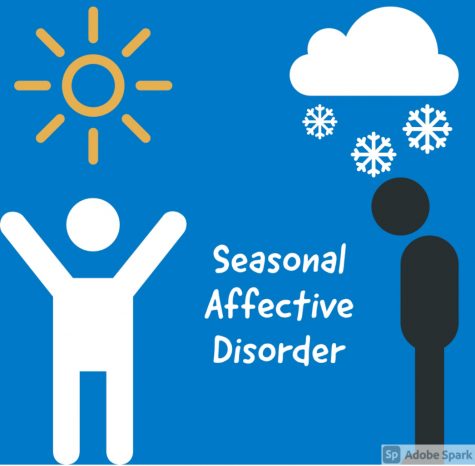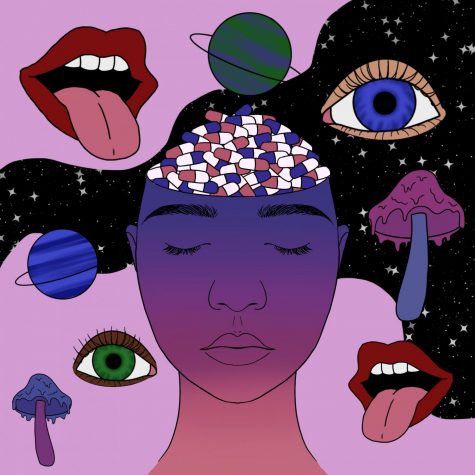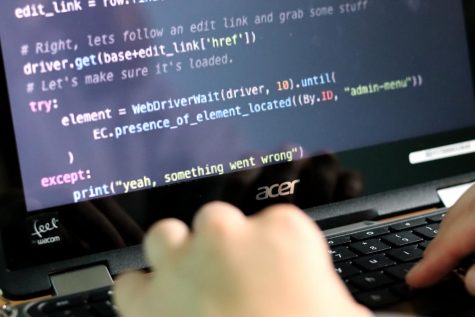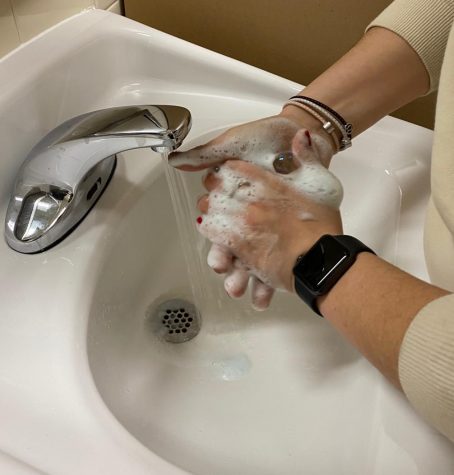Increased Technology Use May Cause Permanent Eye Damage
Remote learning can have an effect on students’ eyes due prolonged exposure to computer screens.
Looking at computer screens all day used to be highly discouraged because of the damage it could cause to one’s eyes. Ever since remote learning began last spring, students have no choice but to stare at screens all day, which has posed the idea of schools possibly providing blue light glasses to students.
The blue light released from computers is damaging to the naked eye and could possibly cause eye damage especially throughout a long period of time.
According to All About Vision, eyes are not very good at blocking out blue light, and unlike UV rays, all visible blue light passes through the cornea and lens. Blue light can reach the light-sensitive retina and may contribute to digital eye strain.
Now that schools are mainly virtual, it has caused students to be on computers for an excessive amount of time. Some students have noticed the effect of not having blue light glasses and what that can do to their eyes, which can result in them losing motivation for completing their school work.
“[Bluelight] could make our eyesight worse, obviously,” junior Cheyenne Shefka said. “It would make us not want to do our schoolwork, just because we have headaches from looking at our screen from trying to pay attention in class.”
Other students may agree that the blue light ejected from screens may have an effect on their eyes and motivation, which could contribute to why they have purchased blue light glasses. They may think it would be more convenient for schools to give them out, since they may not be easily accessible to everyone.
“I get fewer technology headaches, and it is easier to look at the screen for longer periods of time,” junior Hadde Luebke said. “It is not the school’s fault for the pandemic and having to do online learning, but I think it would just be another step to show the students that they care about every one of us and want the best for us.”
It seems as if blue light glasses would be a good option to protect eyes from the blue light emitted from screens, and would be appreciated by students if schools provided them. However, there are other alternatives to the matter.
“We use Chromebooks, and there is a chrome extension that they offer,” anatomy and biology teacher Elizabeth Pohlman said. “It’s a free extension called ‘Screen Shader’; it is one of those things that would be an easy way to prevent any kind of risk to students and staff, in case we find out that there is a direct correlation between blue light exposure from increased time on screens and macular degeneration.”
The extension reduces the brightness on the computer to limit the amount of eye strain on the student or staff member. The use of the extension may be a more practical way to take extra precautions to protect the students’ and staff’s eyes, making the idea of schools giving out blue light glasses not as effective as some may think.
“I think that if studies were done down the road that found that blue light emission does, in fact, increase macular degeneration rates in people regardless of their genetics,” Pohlman said. “There are things that we can do.”
Some students may assume that blue light glasses can help them stay motivated on their schoolwork since it will block the light that may cause them headaches and eye aches; however, there are free alternatives that are readily available to every student. Because of the other options accessible, it may be viewed as unnecessary for the schools to give out blue light glasses.

Diya Schon is a senior and has been a part of the Tom Tom staff for three years. In her free time, she enjoys spending time with her dog, procrastinating and napping. Two things she absolutely loves are carbs and cheese.









